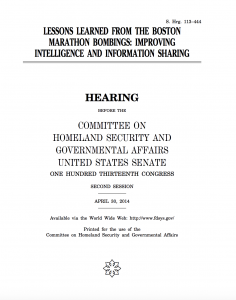
The 2013 Boston Marathon bombings lead to a review coordinated between the CIA, Department of Justice, and Department of Homeland Security. It was conducted just almost a year after the attack, and its purpose was to give an opportunity to “review what lessons [had] been learned from the actions and events leading up to the attack in order to prevent… a similar incident from ever happening again” (1). During the hearing, these agencies conducted a review of the handling and sharing of information available to the U.S. government prior to the Boston Marathon bombings. As one might expect, a multitude of this information is classified, as it is a matter of national security, but from accessible, unclassified documents, there were some main takeaways from the review that are public knowledge.
Some of the main findings from the review include the fact that the FBI, CIA, DHS, and NCTC (the National Counterterrorism Center) generally shared information and followed procedures appropriately.
Another finding was that there were a few areas where broader information sharing between agencies may have been required, such as FBI coordination with the CIA after receiving information from FSB in 2011. This is in reference to the 2011 instance where the FSB alleged that Tamerlan Tsarnaev was an adherent of radical islam and that he was traveling to Russia to join underground groups in Dagestan and Chechnya (22). The JTTF in Boston (Joint Terrorism Task Force) conducted an assessment and determined that Tamerlan had no nexus to terrorism. All of this information, however, was kept between the FBI and Boston JTTF. When similar information was shared between the FSB and the CIA in the following September, the CIA passed it on to the NCTC, FBI, DHS, and Department of State. It was then that Tamerlan was added to a terrorist watchlist.
Overall, the DOJ OIG agreed with the steps the FBI had taken and recommended that the FBI take additional steps to share threat information with state and local partners more proactively. One way they recommended doing so was by suggesting the establishment of a procedure for notifying both state and local representatives on JTTF (Joint Terrorism Task Force) when they conduct a counterterrorism assessment on an individual residing in a representative’s area of responsibility. This would allow a more open line of communication between state and local representatives to JTTFs, giving greater opportunity to share pertinent information with the FBI as well.
Additionally, since the marathon bombings, US Customs and Border Patrol has taken steps to improve the vetting process of watch listed individuals.
Upon the conclusion of the review, it was generally agreed upon that had these areas needing improvement were functioning at their best before the attack, it is very likely that the bombings still would have occurred.
